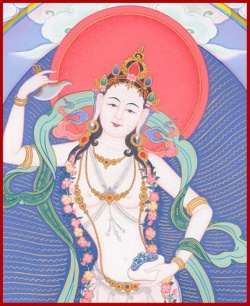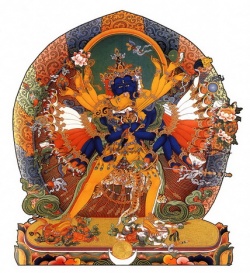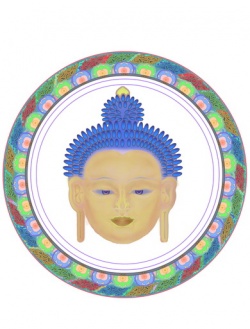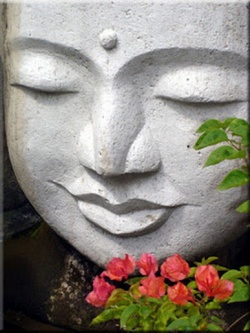Paṭisallāṇā: Solitude
Saɱyutta Nikāya:
III. Khandhā Vagga:
22: Khandhāsaɱyutta
Sutta 6
Paṭisallāṇā
Solitude
Translated by F. L. Woodward
Edited by Mrs. Rhys Davids
Copyright The Pali Text Society
[1] Thus have I heard:—
The Exalted One was staying at Sāvatthī.
Then thus spake the Exalted One:
2. 'Apply yourselves, brethren, to solitude.[1]
A brother who is given to solitude knows a thing as it really is.
3. And what does he know as it really is?
The arising of body
and the passing away thereof;
the arising of feeling
and the passing away thereof;
the arising of perception
and the passing away thereof;
the arising of activities[2]
and the passing away thereof;
the arising of consciousness
and the passing away thereof.
And what, brethren,
is the arising of body?
Herein, brethren, one is enamoured,
one welcomes;
having clung one persists.
To what?
He is enamoured of body;
he welcomes body,
clings to body;
so clinging there comes a lure upon him.
That lure which is in body is grasping.
Conditioned by that grasping is becoming.
Conditioned by becoming is birth.
Conditioned by birth
old age and decay,
sorrow and grief,
woe, lamentation and despair
together come into being.
Such, brethren, is the arising of body.
Thus is the arising of this whole mass of Ill.
§
And what, brethren,
is the arising of feeling?
Herein, brethren, one is enamoured,
one welcomes;
having clung one persists.
To what?
He is enamoured of feeling;
he welcomes feeling,
clings to feeling;
so clinging there comes a lure upon him.
That lure which is in feeling is grasping.
Conditioned by that grasping is becoming.
Conditioned by becoming is birth.
Conditioned by birth
old age and decay,
sorrow and grief,
woe, lamentation and despair
together come into being.
Such, brethren, is the arising of feeling.
Thus is the arising of this whole mass of Ill.
§
And what, brethren,
is the arising of perception?
Herein, brethren, one is enamoured,
one welcomes;
having clung one persists.
To what?
He is enamoured of perception;
he welcomes perception,
clings to perception;
so clinging there comes a lure upon him.
That lure which is in perception is grasping.
Conditioned by that grasping is becoming.
Conditioned by becoming is birth.
Conditioned by birth
old age and decay,
sorrow and grief,
woe, lamentation and despair
together come into being.
Thus is the arising of this whole mass of Ill.
Such, brethren, is the arising of perception.
§
And what, brethren,
is the arising of the activities?
Herein, brethren, one is enamoured,
one welcomes;
having clung one persists.
To what?
He is enamoured of the activities;
he welcomes the activities,
clings to the activities;
so clinging there comes a lure upon him.
That lure which is in the activities is grasping.
Conditioned by that grasping is becoming.
Conditioned by becoming is birth.
Conditioned by birth
old age and decay,
sorrow and grief,
woe, lamentation and despair
together come into being.
Thus is the arising of this whole mass of Ill.
Such, brethren, is the arising of the activities.
§
And what, brethren,
is the arising of of consciousness?
Herein, brethren, one is enamoured,
one welcomes;
having clung one persists.
To what?
He is enamoured of consciousness;
he welcomes consciousness,
clings to consciousness;
so clinging there comes a lure upon him.
That lure which is in consciousness is grasping.
Conditioned by that grasping is becoming.
Conditioned by becoming is birth.
Conditioned by birth
old age and decay,
sorrow and grief,
woe, lamentation and despair
together come into being.
Thus is the arising of this whole mass of Ill.
Such, brethren, is the arising of consciousness.
And what, brethren, is the passing away of body?
In this case, brethren, he is not enamoured,
he does not welcome,
not having clung does not persist.
With respect to what?
He is not enamoured of body;
he does not welcome body,
does not cling to body
not having clung he does not persist
with respect to body.
In him, not being enamoured of body,
not welcoming it,
not having clung,
not persisting with respect to body,
there arises not the lure which is in body.
The passing away of that lure
is the passing away of grasping.
The passing away of grasping
is the passing away of becoming.
The passing away of becoming
is the passing away of birth.
The passing away of birth
is the passing away of old age and decay,
sorrow and grief,
woe, lamentation and despair.
This, brethren, is the passing away of body.
Thus is the passing away of this whole mass of Ill.
§
And what, brethren, is the passing away of feeling?
In this case, brethren, he is not enamoured,
he does not welcome,
not having clung does not persist.
With respect to what?
He is not enamoured of feeling;
he does not welcome feeling,
does not cling to feeling
not having clung he does not persist
with respect to feeling.
In him, not being enamoured of feeling,
not welcoming it,
not having clung,
not persisting with respect to feeling,
there arises not the lure which is in feeling.
The passing away of that lure
is the passing away of grasping.
The passing away of grasping
is the passing away of becoming.
The passing away of becoming
is the passing away of birth.
The passing away of birth
is the passing away of old age and decay,
sorrow and grief,
woe, lamentation and despair.
This, brethren, is the passing away of feeling.
Thus is the passing away of this whole mass of Ill.
§
And what, brethren, is the passing away of perception?
In this case, brethren, he is not enamoured,
he does not welcome,
not having clung does not persist.
With respect to what?
He is not enamoured of perception;
he does not welcome perception,
does not cling to perception
not having clung he does not persist
with respect to perception.
In him, not being enamoured of perception,
not welcoming it,
not having clung,
not persisting with respect to perception,
there arises not the lure which is in perception.
The passing away of that lure
is the passing away of grasping.
The passing away of grasping
is the passing away of becoming.
The passing away of becoming
is the passing away of birth.
The passing away of birth
is the passing away of old age and decay,
sorrow and grief,
woe, lamentation and despair.
This, brethren, is the passing away of perception.
Thus is the passing away of this whole mass of Ill.
§
And what, brethren, is the passing away of the activities?
In this case, brethren, he is not enamoured,
he does not welcome,
not having clung does not persist.
With respect to what?
He is not enamoured of the activities;
he does not welcome the activities,
does not cling to the activities
not having clung he does not persist
with respect to the activities.
In him, not being enamoured of the activities,
not welcoming it,
not having clung,
not persisting with respect to the activities,
there arises not the lure which is in the activities.
The passing away of that lure
is the passing away of grasping.
The passing away of grasping
is the passing away of becoming.
The passing away of becoming
is the passing away of birth.
The passing away of birth
is the passing away of old age and decay,
sorrow and grief,
woe, lamentation and despair.
This, brethren, is the passing away of the activities.
Thus is the passing away of this whole mass of Ill.
§
And what, brethren, is the passing away of consciousness?
In this case, brethren, he is not enamoured,
he does not welcome,
not having clung does not persist.
With respect to what?
He is not enamoured of consciousness;
he does not welcome consciousness,
does not cling to consciousness
not having clung he does not persist
with respect to consciousness.
In him, not being enamoured of consciousness,
not welcoming it,
not having clung,
not persisting with respect to consciousness,
there arises not the lure which is in consciousness.
The passing away of that lure
is the passing away of grasping.
The passing away of grasping
is the passing away of becoming.
The passing away of becoming
is the passing away of birth.
The passing away of birth
is the passing away of old age and decay,
sorrow and grief,
woe, lamentation and despair.
This, brethren, is the passing away of consciousness.
Thus is the passing away of this whole mass of Ill.
Footnotes
- ↑ Paṭisallāna. Paṭi-saŋ-lī, 'sticking-on-again,' is applied to solitude chosen in order to meditate.
- ↑ Text follows here with 'Yathā pathamasutte tathā vitthāretabbo||'; Woodward trans. (As in the first section, so should this be expanded.), and footnotes 'So the Burmese recensions. The Sinh. MSS. expand.' I understand this to refer to the previous sutta, not the first sutta of the saŋyutta — Ed.






















